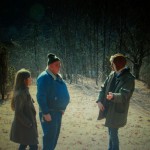Words and Photos by Aaron Richter
Latest Album: Bitte Orca (Domino)
What’s Been Said: “Much ink will likely be spilled on 2009 being the year that Brooklyn’s experimental class finally went ‘pop,’ and–with apologies to Animal Collective and Grizzly Bear–it’d be hard to find a better thesis statement.” – The A.V. Club
“A similar sense of accidental discovery governs the band’s fifth disc–jagged riffs, distortion and fragrant folk melodies ride curveball beats that evoke TV on the Radio or doo-wop or Afro pop. Add Dave Longstreth’s and Amber Coffman’s chamber-chorale-on-Red Bull vocals and you have ample art-rock zaniness. It’s at once attention-deficient and micromanaged, exhilarating and aggravating.” – Rolling Stone
“Lead single ‘Stillness Is the Move,’ in particular, deserves a permanent place in the barbecue playlists of those who like their summertime jams 
a little–well, a lot–weird.” – Entertainment Weekly
“At a time when even fans note that much indie rock is essentially conservative, juggling a handful of retro signifiers–Pixies meet Pavement, Spacemen 3 meet Kraftwerk, and so on–Dirty Projectors’ music defies easy categorization and is anything but safe.” – The New York Times
Our Take: Dirty Projectors are good at what they do. David Longstreth is, no doubt, immensely talented–as a composer, a creative visionary and a band leader. This isn’t the argument. These facts are undeniable. Just ask Björk. What’s taken self-titled to task in the months we’ve been examining the group’s latest studio record, Bitte Orca, is whether all that talent and big ideas can cloud the blueprint for, well, quality rock music. The obvious answer is yes, of course. But the Dirtys make such a verdict difficult simply because they’re so hard to love and impossible to hate, entirely.
At this past Sunday’s JellyNYC Pool Parties at the Williamsburg Waterfront, self-titled watched from the photo pit as Longstreth, Angel Deradoorian and company inadvertently whipped up a crew of front-row-planted college-age boys into a emotional frenzy filled with an odd mix of teary-eyed screams and bro-hugging. The response was so strong and defined that we felt as if we were missing something big as the songs proceeded to lull around in awkward, jerky syncopation, seemingly Wayne’s World-inspired guitar solos (“diddle-le-do, diddle-le-do”), uncomfortable stage shimmying and exactly one instance of jaw-dropping vocal acrobatics. Removed from the studio, the songs, stripped of their sweeping dynamics, strained for impact and gradually lost momentum. And without all the intricacies, Dirty Projectors are really just R.Kelly-fetishizing R&B dressed up for an indie-rock audience that gets wet over any band that’s seen Stop Making Sense enough times to get the moves right.
Hypeworthy? Read enough reviews of Bitte Orca, and it seems like critics feel a certain responsibility to like, or at least humor, Dirty Projectors. But as clumps of praise pile up, we’ve yet to take in a single convincing co-sign. Now why is that? Maybe–and let’s be honest, we’re totally projecting–because Bitte Orca, though technically impressive, strips the fun out of listening, sucks the joy from the group’s influences and reference touchstones, leaving a clinical core of unapproachable experimentation dry with awkward high-brow stuffiness. We’ll give the group “Two Doves,” which is absolutely beautiful and a perfect opener to the Pool Parties outdoor set, if only because Longstreth and Deradoorian give full cues too “These Days” without feeling the need muss the mood with unnecessary adornment. But otherwise, listening to Bitte Orca is like walking into a museum and being warned not to touch the art. Though it’s not as if you’d know exactly how to interact with it were you given permission to get your mitts dirty.

